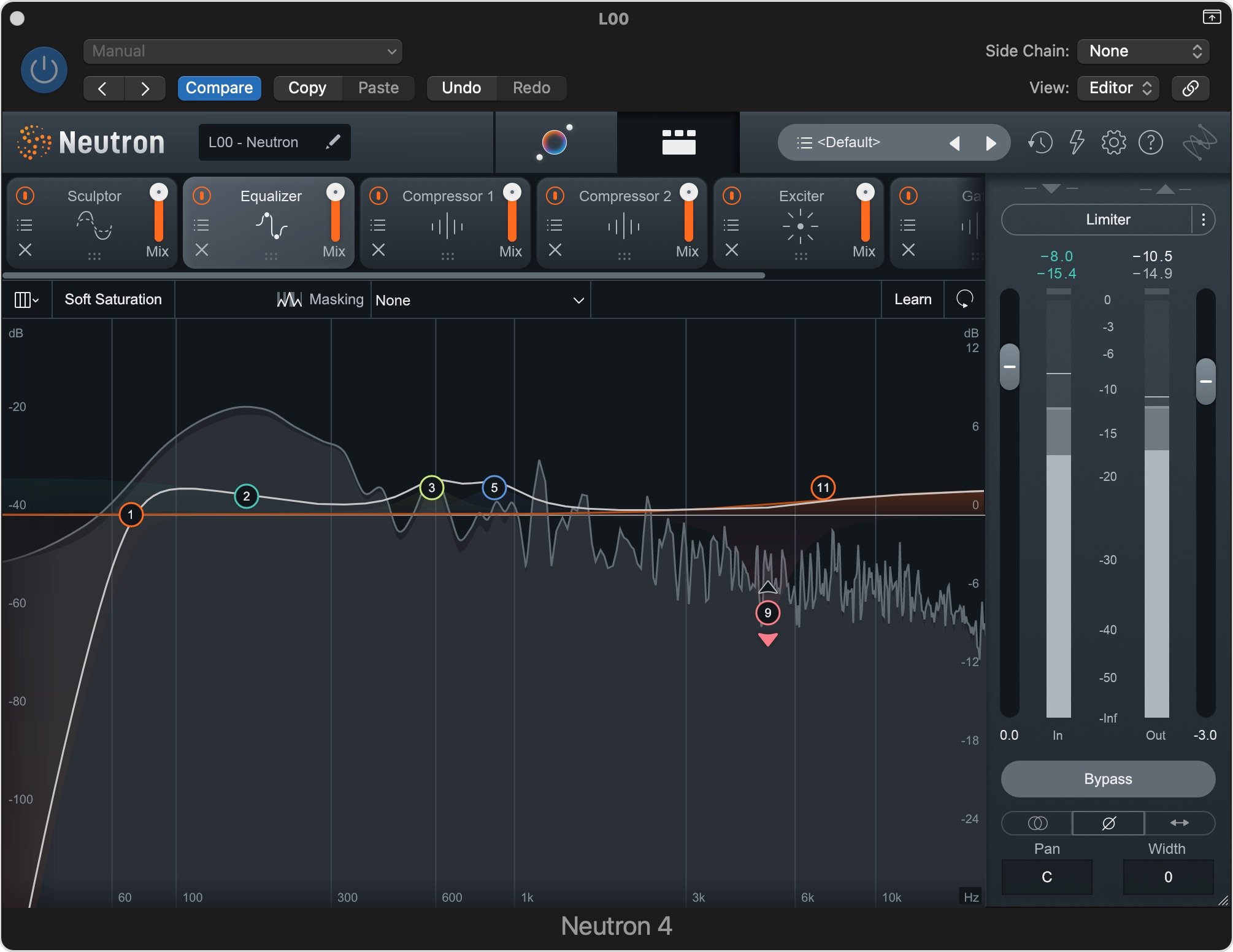Review : Izotope Neutron 4
Mixing your own recordings is a skill that is built over time. Sometimes it can get confusing because of the massive scope and breadth of plugins for the process. Let’s take a look at Neutron 4 from Izotope as an excellent mixing tool that grows with you.
Once you have your recordings in your DAW and you’ve done your basic edits, cutting, trimming, moving and the like to get the core track the way that you want it, you are going to need to do the mixing work for each track. Learning to mix is a different skill from learning to record, and also different from mastering which is putting all your mixes together and finalizing the song.
Izotope makes plugins, like many other plugin makers. They take a slightly different approach that is very beneficial to people learning to mix. If for example, you do podcasts or voice based streaming, their tool called Nectar brings together the pieces that you will need to make a high quality voice mix. Of course it also works a charm for singers and is highly recommended by me.
In this case though, I want to look at recorded instrument tracks, recordings made of real instruments, not loops or MIDI instruments. Real guitars, basses, drums, horns and the like.
Which Plugins Do I Use?
When we start out we have some idea of which kinds of plugins we will likely want to use in our mixing workflow. We might need a noise gate to cut hiss or pickup noise, or just the basic squeaks on strings as we move to get started playing or finish recording. We will typically want some kind of equalization of a more precise nature than a tone knob or even graphic EQ where we can be very selective of what is happening and be able to choose different types of equalizer functions, such as highpass filters, notch filters, low and high shelf filters and even dynamic EQ. These are all wonderful tools, but if you are already cringing a bit at all the wording, I get it, stay with me. You will also know of compression and the varying types of compressors but not yet understand which kind of compression suits what task. You could also be aware of Exciters, that exist to put some punch or pop into a track.
Now you could buy a bunch of different plugins and use the old experimental trial and error model, which can be very effective if not time consuming and often frustrating, or you could look at a tool like Neutron 4, which brings those pieces into a single interface and also provides scalable control so you can learn what each does at your own pace, and also learn how they work together and how you order them changes things.
The first image shows a screenshot of an equalizer module in Neutron. I simply grabbed it after getting a suggested EQ from the software, and adjusting it in real time while the track looped. So you can see what the equalizer is doing at different frequencies and add, move, delete eq options at your pleasure.
How Did I Get the Suggested EQ?
For folks new to mixing, this is where Neutron 4 excels. Where other tools will deliver a stack of presets, that are all very good, but where you have to cycle through a lot of them to find one that works for you, or at least provides a starting point for each individual module, in Neutron 4 you have the Assistant. The assistant is a powerful algorithm that listens to your track and then uses stored references to propose modules and adjustments. Sometimes what you get is such a big improvement that you just accept it and move on. For beginners, the Assistant saves a ton of time and provides you adjustments that you can review on your own schedule to learn what they do. You can even try different things and use the Compare function to see which you like best. There’s also a system Bypass button so you can toggle Neutron’s processing on and off at will. I have yet to find a situation where Neutron’s proposal made the track sound worse to me.
Growing Skill
In the next phase of development, you can use the Assistant as the starting point, letting it build a proposal. Then you can go into each module and tweak it and again try different options with the Compare option. You can also turn individual modules on and off to determine if the module is making a difference that pleases you. There are also plenty of presets within each module if you want to try that route. I like that the presets have useful names that tell you what they are going to deliver. Again you can start with a preset and tweak it to your preference. It’s your music so you get to decide.
It’s All You
When you want to try things all on your own, you can also choose the modules that you want to use and put them in the order that suits you best. You can follow guidelines or not, you are completely free to do what you want. In this case you could start a module from a preset, or sculpt the module effect entirely while you are listening to your track loop. When you start doing this, it takes more time, but you really get a great handle on what does what, and why you might want to do something.
Growing in One Tool
There are probably thousands of plugins out there. When I started out doing home recording, even after some time apprenticing in live stage and in small studios, I overloaded on plugins and have a lot that I still have no idea what difference they are making because I bought bundles. This has been counterproductive, and I would have been better suited to grow with a tool like Neutron first. I did not that and that probably slowed my progress a bit.
I am now at the point where I use Neutron 4 for the basic stuff and only add additional plugins, or use a dedicated plugin where I like it better in that instance than what Neutron can do for me. I can tell you that for cutting samples, or building quick demos, Neutron 4 is a huge time saver.
In Summary
Neutron 4 is just one of many plugin applications that Izotope sells. I bought in using their Elements kit and then when I discovered how good they were, I waited for an offer to get the full kit. I am very happy with the tools that I use which include Nectar Pro, Neutron 4, RX Pro for Music, Ozone Pro, Tonal Balance Control Pro and Neoverb Pro. I got other tools with the kit, that I am not working with yet, so there is more here for me when I need it. I chose the Izotope Music Production Suite Pro which is an annual subscription, but they have multiple options. To find out more, head over to YouTube and go to Izotope’s channel there. They put up a lot of training materials that are really well done and can help get you up to speed really quickly. You can also go to https://www.izotope.com/ to learn more about Neutron 4 and other Izotope products.
As usual, I receive no compensation in any way for these reviews, and I pay for the software in full out of my own pocket.
Please subscribe to the articles and podcast to be notified whenever new content is posted. Thanks for reading and until next time, peace.

